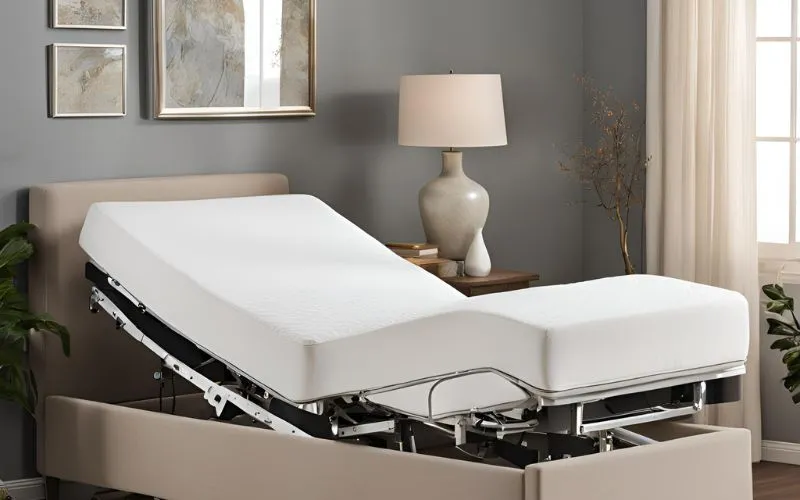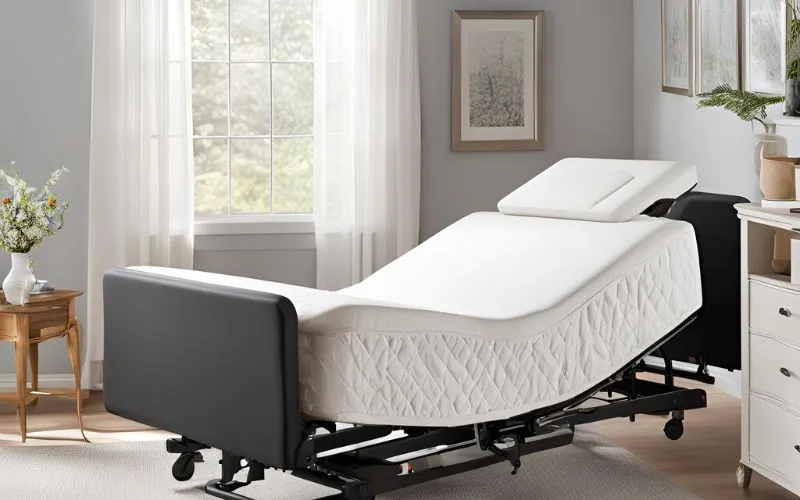The Benefits of Adjustable Beds for Chronic Pain

Introduction
Welcome to our comprehensive guide on the benefits of adjustable beds for chronic pain relief. In this article, we will explore the crucial connection between chronic pain and quality sleep, the impact of inadequate sleep on chronic pain, and how adjustable beds can provide immense relief and comfort for individuals battling chronic pain.
Understanding Chronic Pain and the Need for Quality Sleep
What is Chronic Pain?
Chronic Pain: Understanding the Long-Term Impact
Chronic pain is a complex and challenging condition that profoundly affects individuals for extended periods. It encompasses persistent pain that lasts for weeks, months, or even years, posing significant physical and emotional challenges. The long-term nature of chronic pain often requires a comprehensive approach to management, addressing both the physical sensations and the emotional toll it takes on individuals.
The sources of chronic pain are diverse and can originate from various underlying conditions. Some common causes and examples include:
- Back Pain: Often linked to spinal issues, muscle strain, or injuries.
- Arthritis: Results in joint pain, stiffness, and limited mobility.
- Migraines: Intense and recurrent headaches that may be accompanied by sensory disturbances.
- Nerve Damage: Causes persistent shooting pain, tingling, and numbness.
The implications of chronic pain extend beyond physical discomfort, greatly affecting daily routines, mobility, and emotional well-being. Individuals living with chronic pain often experience:
- Disrupted Sleep Patterns: Persistent pain can interfere with restful sleep, leading to fatigue and exacerbating the effects of chronic pain.
- Limited Activities: Pain can restrict mobility and hinder participation in various activities, impacting an individual’s overall enjoyment of life.
- Emotional Distress: Constant pain can lead to heightened stress, anxiety, and depression, affecting mental health and overall quality of life.
In conclusion, chronic pain encompasses a spectrum of conditions that persist over prolonged periods, influencing physical, emotional, and social aspects of an individual’s life. Understanding the causes and wide-ranging impacts of chronic pain is crucial for developing effective strategies to manage and cope with this challenging condition.
The Connection between Chronic Pain and Sleep
There is a strong interplay between chronic pain and sleep. Chronic pain can make it challenging to fall asleep or stay asleep, leading to disrupted sleep patterns and overall poor sleep quality. Conversely, inadequate sleep can exacerbate chronic pain, leading to a vicious cycle of discomfort and sleep disturbances.
- Chronic Pain’s Impact on Sleep:
- Chronic pain is known to cause restlessness and discomfort, making it difficult for individuals to achieve a restful night’s sleep.
- Prolonged periods of pain can lead to insomnia, frequent awakenings, and difficulty returning to sleep, ultimately taking a toll on overall sleep quality.
- Research suggests that individuals with chronic pain experience alterations in sleep architecture, such as decreased slow-wave sleep and increased light sleep, further contributing to sleep disturbances.
- Sleep’s Influence on Chronic Pain:
- Insufficient sleep can heighten the perception of pain and lower the threshold for pain tolerance, intensifying the experience of chronic pain.
- Lack of sleep diminishes the body’s natural ability to cope with pain, hindering the process of pain modulation, and amplifying discomfort.
- Additionally, inadequate sleep can lead to heightened levels of inflammation, which exacerbates chronic pain conditions.
Impact of Inadequate Sleep on Chronic Pain
Inadequate sleep can have profound effects on individuals suffering from chronic pain. Research has shown that the relationship between inadequate sleep and chronic pain is bidirectional, with each exacerbating the other. Here are some key points highlighting the impact of inadequate sleep on chronic pain:
- Heightened Pain Sensitivity: Lack of quality sleep can lead to an increased sensitivity to pain. This means that individuals may experience more intense pain sensations, making it challenging to manage chronic pain effectively.
- Reduced Pain Tolerance: Sleep deprivation can lower the threshold for tolerating pain, leading to a decreased ability to cope with chronic pain symptoms.
- Increased Inflammation: Inadequate sleep is associated with higher levels of inflammation in the body, which can exacerbate chronic pain conditions by causing further damage to tissues and worsening the overall pain experience.
- Altered Healing Processes: Quality sleep is essential for the body’s natural healing processes. When sleep is inadequate, the body’s ability to repair and recover from chronic pain conditions is compromised, leading to prolonged suffering and reduced quality of life.
Benefits of Adjustable Beds for Chronic Pain Relief
Adjustable Beds: An Overview
Adjustable beds are designed to offer customizable positioning, providing individuals with the ability to elevate their upper body or legs to alleviate pressure, promote better circulation, and enhance overall comfort. These beds can be immensely beneficial for individuals grappling with chronic pain, offering them a personalized sleep setup that caters to their unique comfort needs.
- Customizable Positioning: Adjustable beds allow users to customize the positioning of their upper body and legs, providing relief from pressure and promoting better circulation.
- Alleviation of Chronic Pain: The personalized sleep setup offered by adjustable beds can significantly alleviate chronic pain, providing individuals with tailored comfort and support.
- Enhanced Comfort: By elevating the upper body or legs, adjustable beds enhance overall comfort, leading to improved sleep quality and reduced discomfort.
Promoting Better Sleep with Adjustable Beds
By allowing users to adjust the inclination of the bed, adjustable beds can contribute to better sleep quality for individuals with chronic pain. Elevating the upper body can alleviate pressure on the lower back, while raising the legs can aid in reducing swelling and improving circulation, leading to a more restful and rejuvenating sleep experience.
Customized Comfort and Support for Chronic Pain
Adjustable beds offer a wide range of customizable features that make them ideal for addressing chronic pain. Here’s how individuals can benefit from the customized comfort and support provided by these beds:
- Targeted Pain Relief: Adjustable beds allow users to customize the position to provide targeted relief for specific areas of chronic pain, such as the lower back, hips, or shoulders. By elevating or reclining different sections of the bed, individuals can alleviate discomfort and reduce strain on affected areas.
- Enhanced Lumbar Support: Many adjustable beds are designed with specialized lumbar support features, which can be adjusted to provide optimal support for the lower back. This customization helps individuals with chronic back pain experience greater comfort and reduced pressure on the lumbar region.
- Pressure Point Reduction: By adjusting the position of the bed, users can minimize pressure points that often contribute to chronic pain conditions. This can be particularly beneficial for individuals with conditions such as fibromyalgia or arthritis, as they can reduce the impact of pressure on sensitive areas.
- Personalized Sleep Positions: Adjustable beds enable users to find their most comfortable sleep positions, which is crucial for those with chronic pain. Whether it’s finding the optimal head and foot elevation or achieving a zero-gravity position, personalized sleep settings can significantly improve comfort and help alleviate pain.
With the ability to tailor the bed’s position and features to their specific needs, individuals can create an optimal sleep environment that promotes pain relief and enhances overall comfort. This level of customization is invaluable for those dealing with chronic pain, as it empowers them to take control of their sleep quality and comfort.
Improving Sleep Quality to Alleviate Chronic Pain
By enhancing sleep quality and promoting better rest, adjustable beds can play a pivotal role in alleviating chronic pain. Quality sleep is integral to pain management, and adjustable beds offer individuals the means to create an environment conducive to restorative sleep, ultimately aiding in the relief of chronic pain.
Reducing Pressure Points and Discomfort
Adjustable beds are designed to minimize pressure points and discomfort by allowing users to adjust the bed’s position to alleviate strain on specific areas of the body. This targeted relief can significantly reduce the discomfort associated with chronic pain, leading to improved sleep quality and enhanced overall well-being.
- Advanced Positioning: With adjustable beds, users can elevate their legs to promote better blood circulation and reduce pressure on the lower back and hips.
- Customizable Support: The adjustable settings of the bed allow users to find the most comfortable position, distributing weight evenly across the mattress and providing support to areas prone to pressure points.
- Enhanced Comfort: By adjusting the bed to support the natural curves of the body, users can experience reduced discomfort and achieve a more restful sleep.
Furthermore, adjustable beds offer specialized features such as massage functions and zero-gravity positioning, which can further alleviate pressure points and enhance overall comfort.
Choosing the Right Adjustable Bed for Chronic Pain
Key Features to Look for in Adjustable Beds
When selecting an adjustable bed for chronic pain relief, key features to consider include:
- Customizable positioning
- Lumbar support
- Multiple mattress firmness options
- Programmable settings
These features enable individuals to personalize their sleep experience and address the specific needs associated with chronic pain. Customizable positioning allows users to find the most comfortable angle to alleviate pressure points, while lumbar support ensures proper spinal alignment. Multiple mattress firmness options cater to varying preferences and conditions, such as arthritis or sciatica, and programmable settings offer convenience and flexibility.
Important Considerations for Chronic Pain Sufferers
Chronic pain sufferers require careful consideration when choosing an adjustable bed to ensure the best support and comfort for their specific needs. Here are the key factors to take into account:
- Adjustability: Look for a bed with multiple adjustable positions, including head and foot elevation, to accommodate varying pain levels and preferences.
- Support and Comfort: Prioritize beds with high-quality memory foam or latex mattresses, as they offer superior support and pressure relief for chronic pain sufferers.
- Material and Fabric: Opt for hypoallergenic and breathable materials to minimize potential skin irritations or allergic reactions that can exacerbate discomfort.
- Ergonomic Design: Ensure that the bed’s design promotes proper spinal alignment and reduces pressure points, especially for individuals with chronic back issues.
- Compatibility: Assess the bed’s compatibility with existing mattresses or the option to purchase one known for enhancing pain relief and sleep quality.
- Additional Features: Consider additional features such as massage settings, zero-gravity positioning, and USB charging ports that can further enhance the comfort and therapeutic benefits of the bed.
Tips for Selecting the Best Adjustable Bed
When seeking the best adjustable bed for chronic pain, individuals should consider several key factors to ensure they find the most suitable option for their specific needs. Here are some tips to help you select the best adjustable bed:
- Research Reputable Brands: Start by researching reputable brands that specialize in adjustable beds designed for chronic pain management. Look for companies with a track record of producing high-quality, durable products that are tailored to the needs of individuals with chronic pain.
- Read Customer Reviews: Take the time to read customer reviews and testimonials about the adjustable beds you are considering. Pay attention to feedback from individuals who also suffer from chronic pain, as their experiences can provide valuable insights into the comfort, support, and overall performance of the bed.
- Test the Beds In-Person: Whenever possible, visit showrooms or stores to personally test the adjustable beds you are interested in. This hands-on approach allows you to assess the bed’s adjustability, comfort, and support to determine if it meets your specific needs for managing chronic pain.
- Explore Warranty Options: Look into the warranty options offered by the adjustable bed manufacturers. A comprehensive warranty can provide peace of mind and protection against potential defects or issues that may arise with the bed over time.
- Understand Return Policies: Familiarize yourself with the return policies of the retailers or manufacturers selling adjustable beds. Knowing the terms and conditions for returns can help you make an informed decision and ensure that you have options if the bed does not meet your expectations.
- Seek Professional Recommendations: Consult healthcare professionals, such as chiropractors or physical therapists, for recommendations on the best adjustable beds for chronic pain management. Their expertise and experience can guide you in selecting a bed that aligns with your unique pain management needs.
Sleeping Positions and Strategies for Chronic Pain Management
Chronic pain can significantly disrupt sleep quality, leading to increased discomfort and reduced overall well-being. Exploring various sleeping positions and strategies tailored to chronic pain management can make a substantial difference in managing the impact of chronic pain on sleep.
- Back Sleeping Position: Sleeping on your back with a small pillow under your knees can help maintain the natural curve of the spine and alleviate lower back pain.
- Side Sleeping Position: For individuals with hip or shoulder pain, sleeping on the side with a pillow between the knees can help align the spine and relieve pressure points.
- Stomach Sleeping Position: While not recommended for chronic pain sufferers, if you prefer to sleep on your stomach, a flat pillow under the abdomen can reduce strain on the back.
Utilizing specialized pillows and supportive accessories can enhance sleep quality and alleviate the impact of chronic pain. These include:
- Orthopedic Pillows: Designed to provide proper neck and spine alignment, orthopedic pillows can reduce neck and shoulder pain.
- Cervical Pillows: Shaped to support the natural curve of the neck, cervical pillows can minimize discomfort and stiffness.
- Body Pillows: Offering full-body support, body pillows can help reduce pressure on the hips, knees, and lower back.
- Mattress Toppers and Pads: Adding a mattress topper or pad with targeted support can alleviate joint pain and distribute body weight evenly.
By incorporating these strategies and adopting effective measures, individuals can enhance their sleeping experience, improve sleep quality, and alleviate the impact of chronic pain, ultimately promoting better overall well-being.
Conclusion
Chronic pain can disrupt sleep and diminish a person’s quality of life, but adjustable beds offer a promising solution for alleviating discomfort and improving sleep quality. By understanding the profound connection between chronic pain and sleep, individuals can make informed decisions when selecting adjustable beds to mitigate the challenges posed by chronic pain, ultimately paving the way for enhanced comfort, relief, and overall well-being.




